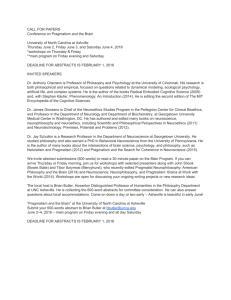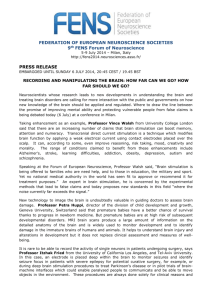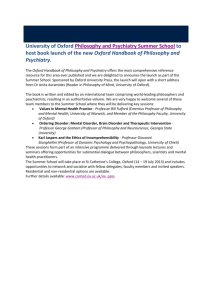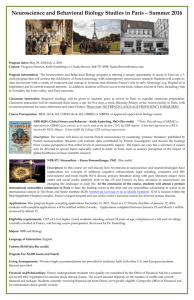Graduate Seminar in Philosophy and Neuroscience
advertisement
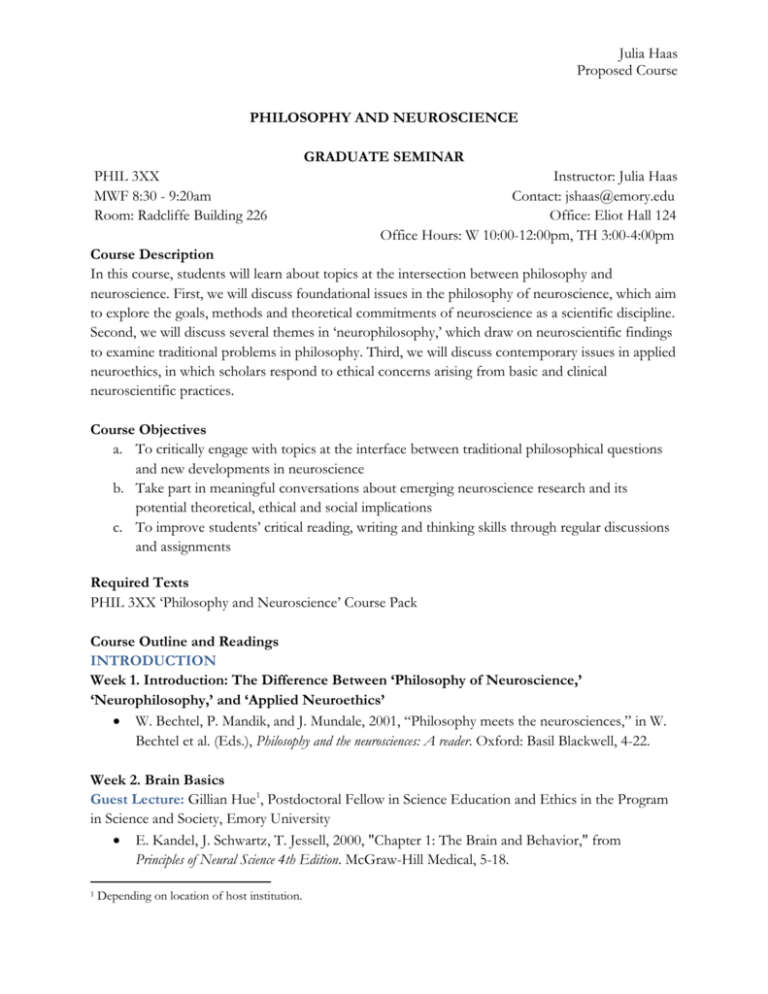
Julia Haas Proposed Course PHILOSOPHY AND NEUROSCIENCE GRADUATE SEMINAR PHIL 3XX MWF 8:30 - 9:20am Room: Radcliffe Building 226 Instructor: Julia Haas Contact: jshaas@emory.edu Office: Eliot Hall 124 Office Hours: W 10:00-12:00pm, TH 3:00-4:00pm Course Description In this course, students will learn about topics at the intersection between philosophy and neuroscience. First, we will discuss foundational issues in the philosophy of neuroscience, which aim to explore the goals, methods and theoretical commitments of neuroscience as a scientific discipline. Second, we will discuss several themes in ‘neurophilosophy,’ which draw on neuroscientific findings to examine traditional problems in philosophy. Third, we will discuss contemporary issues in applied neuroethics, in which scholars respond to ethical concerns arising from basic and clinical neuroscientific practices. Course Objectives a. To critically engage with topics at the interface between traditional philosophical questions and new developments in neuroscience b. Take part in meaningful conversations about emerging neuroscience research and its potential theoretical, ethical and social implications c. To improve students’ critical reading, writing and thinking skills through regular discussions and assignments Required Texts PHIL 3XX ‘Philosophy and Neuroscience’ Course Pack Course Outline and Readings INTRODUCTION Week 1. Introduction: The Difference Between ‘Philosophy of Neuroscience,’ ‘Neurophilosophy,’ and ‘Applied Neuroethics’ W. Bechtel, P. Mandik, and J. Mundale, 2001, “Philosophy meets the neurosciences,” in W. Bechtel et al. (Eds.), Philosophy and the neurosciences: A reader. Oxford: Basil Blackwell, 4-22. Week 2. Brain Basics Guest Lecture: Gillian Hue1, Postdoctoral Fellow in Science Education and Ethics in the Program in Science and Society, Emory University E. Kandel, J. Schwartz, T. Jessell, 2000, "Chapter 1: The Brain and Behavior," from Principles of Neural Science 4th Edition. McGraw-Hill Medical, 5-18. 1 Depending on location of host institution. Julia Haas Proposed Course B.J. Baars, N.M. Gage, 2010, “Chapter 4: The Tools: Imaging the Living Brain,” from Cognition, Brain, and Consciousness, Second Edition: Introduction to Cognitive Neuroscience. Academic Press, 95-126. FOUNDATIONS IN THE PHILOSOPHY OF NEUROSCIENCE Week 3. Reduction and Levels of Explanation J. Fodor, 1974, “Special Sciences,” Synthese, 28: 77–115. P.M. Churchland, P. S. Churchland, 1991, “Intertheoretic Reduction: A Neuroscientist’s Field Guide,” Seminars in the Neurosciences, 2:249-56. R.N. McCauley, 1996, “Explanatory Pluralism and the Co-Evolution of the Theories of Science,” in R. N. McCauley, The Churchlands and their Critics. Blackwell, 17-47. Week 4. Evidence and Experimentation W. Bechtel and R. Stufflebeam, 2001, “Epistemic issues in procuring evidence about the brain: The importance of research instruments and techniques,” in W. Bechtel et al. (Eds.), Philosophy and the neurosciences: A reader. Oxford: Basil Blackwell, 55-81. D. N. Bub, , 2000, Methodological issues confronting PET and fMRI studies of cognitive function: With special reference to Human Brain Function. Cognitive Neuropsychology, 17 (5): 467-484. C. F. Craver, 2002, Interlevel experiments and multilevel mechanisms in the neuroscience of memory. Philosophy of Science 69 Supplement: S83-S97. Week 5. Neuroanatomy and Function W. Bechtel and J. Mundale, 1999, “Multiple Realizability Revisited: Linking Cognitive and Neural States,” Philosophy of Science, 66: 175–207. M. Brett, , I. S. Johnsrude, and A.M. Owen, 2002, "The Problem of Functional Localization in the Human Brain", Nature Reviews Neuroscience 3: 243-249. TOPICS IN NEUROPHILOSOPHY Week 5. Self and Self-Knowledge P. S. Churchland, 2002, “Self and Self-Knowledge,” in Brain-wise: Studies in Neurophilosophy. Cambridge: Massachusetts Institute of Technology, 59-126. Week 6. Consciousness T. Nagel , 1974, “What Is It Like to Be A Bat?” Philosophical Review, 83: 435–450. “Consciousness and Neuroscience,” Francis Krick and Christof Koch, in Philosophy and the Neurosciences: A Reader A. Damasio, “Chapter 2: From Life Regulation to Biological Value,” in Self Comes to Mind: Constructing the Conscious Brain. New York: Random House, 31-58. Julia Haas Proposed Course Week 7. Representation and Knowledge Bechtel, W., 2001, ‘Representations: From Neural Systems to Cognitive Systems,” in W. Bechtel et al. (Eds.), Philosophy and the neurosciences: A reader. Oxford: Basil Blackwell, 332-348. R. Grush, 1997, ‘The architecture of representation,’ Philosophical Psychology 10(1):5-25. R. Stufflebeam, ‘Brain Matters: A Case Against Representations in the Brain,” in W. Bechtel et al. (Eds.), Philosophy and the neurosciences: A reader. Oxford: Basil Blackwell, 395-314. Week 8. Free Will A. Bechara, A. R. Damasio, H. Damasio, and S.W. Anderson, 1994, “Insensitivity to future consequences following damage to human prefrontal cortex,” Cognition 50: 7-15. D.M. Wegner, ‘The mind’s best trick: How we experience conscious will,’ Trends in Cognitive Science, 7, 65-69. S. E. Hyman, “The Neurobiology of Addiction: Implications for Voluntary Control of Behavior,” in J.Illes et. al. (Eds.), The Oxford Handbook of Neuroethics, Oxford: Oxford University Press, 203-217. A. R. Mele, ‘Scientific Skepticism about Free Will,’ Moral Psychology: Historical and Contemporary Readings, Eds. T. Nadelhofer, E. Nahmias, S. Nichols, 295-305. Week 10. Moral Reasoning and Motivation J. Moll, R. de Oliveria-Souza, P.J. Eslinger, 2003, ‘Morals and the human brain: a working model,’ Neuroreport 14:3, 299-305. T. Schroeder, A. Roskies, and S. Nichols, “Moral Motivation,” in J. Doris, The Moral Psychology Handbook J. Greene, 2003, “From neural ‘is’ to moral ‘ought’: What are the moral implications of neuroscientific moral psychology?,” Nature Reviews Neuroscience, 4:847-850. CONTEMPORARY ISSUES IN APPLIED NEUROETHICS Week 11. Enhancement Guest Lecture: Paul Root Wolpe2, Asa Griggs Candler Professor of Bioethics, Emory University M. J. Farah and P.R Wolpe, 2004, “Monitoring and manipulating the human brain: New neuroscience technologies and their ethical implications,” Hastings Center Report, 34: 35–45. H. Greely, B. Sahakian, J. Harris et. al., “Towards responsible use of cognitive-enhancing drugs by the healthy,” Nature Advance Online Publication doi:10.1038/456702a, published online 7 December 2008. M.J. Sandel, “The case against perfection,” The Atlantic Monthly, April 2004, pages 51-62. 2 Depending on location of host institution. Julia Haas Proposed Course Week 12. Women and Neuroethics Hamann S, Herman RA, Nolan CL, Wallen K. 2004. “Men and Women Differ in Amygdala Response to Visual Sexual Stimuli.” Nature Neuroscience 7(4): 411-6. DesAutels, Peggy, 2010, “Sex Differences and Neuroethics.” Philosophical Psychology 23(1): 95111. S. A. Tovino, “Women’s Neuroethics,” in J.Illes et. al. (Eds.), The Oxford Handbook of Neuroethics, Oxford: Oxford University Press, 701-727. Week 12. Neuroscience, Law, and Policy E. R. Murphy and H. Greely, “What Will be the Limits of Neuroscience-Based Mindreading in the Law,” in J.Illes et. al. (Eds.), The Oxford Handbook of Neuroethics, Oxford: Oxford University Press, 635-654. J. Greene and J. Cohen, “For the Law, Neuroscience Changes Nothing and Everything,” in J.Illes et. al. (Eds.), The Oxford Handbook of Neuroethics, Oxford: Oxford University Press, 655674. Week 13. Neuroscience and Public Health Policy Hackman, D. A., Farah, M.J., Meaney, M. J., 2010, 'Socioeconomic status and the brain: mechanistic insights from human and animal research,' in Nature 11, 651-659. Evaluation Grades for this course will be determined by attendance and participation, homework assignments, quizzes, problem sets, and a final exam. I. Attendance and participation: 10% II. Short Essay Writing Assignments (3): 30% There will be three short (3-4page) writing assignments designed to help you integrate the course material and prepare you for the final paper assignment. I will distribute further guidelines, and a portion of one class session will be devoted to paper writing so we can discuss the process in more detail. Each assignment will be due by 9 pm on the night prior to the class for which the reading is assigned and must be submitted via Blackboard. III. Final paper (15-20 pages): 30% You will also write one longer (10-12 page) research paper on a topic of your choice. I will distribute further guidelines, and a portion of one class session will be devoted to writing the final paper. Julia Haas Proposed Course i) Prospectus – A short (500-750 word) outline clearly describing your proposed argument and including your preliminary sources of evidence. The prospectus will be due March X, 2014 at 5pm and must be submitted via Blackboard. ii) Optional Draft – You may choose to submit a draft of your paper on March X 2014. It will be returned to you on April X, 2014. iii) Final Paper – The final draft of your paper will be due on April X, 2014 at 5pm and must be submitted via Blackboard. IV. Final Exam: 30% The final exam will be cumulative. It is scheduled for May Xx, 2014, from x-xpm. Policies Late Work All work is due at the date and time listed. Late work will be penalized by one grade per day (eg. from an A to an A-). Letter Grades A 100-94% B+ 89-87% C+ 79-77% D+ 69-67% F <60% A- 93-90% B 86-84% C 76-74% D 66-60% B- 83-80% C- 73-70% Academic Integrity You are expected to follow the Emory College Honor Code. For more information, please visit http://college.emory.edu/home/academic/policy/honor_code.html Disability and Access If you require any special accommodations, please contact me in person or via email. I will more than happy to work with you and help coordinate any arrangements that may be of assistance. You are also encouraged to contact and register with the Office of Disability Services, Administration Building, Suite 110 and at (404) 727-9877. Revisions to Syllabus Please note: this syllabus is subject to change at any time during the semester. Any changes will be announced in class and noted on a revised syllabus posted to the Blackboard site for the course.
